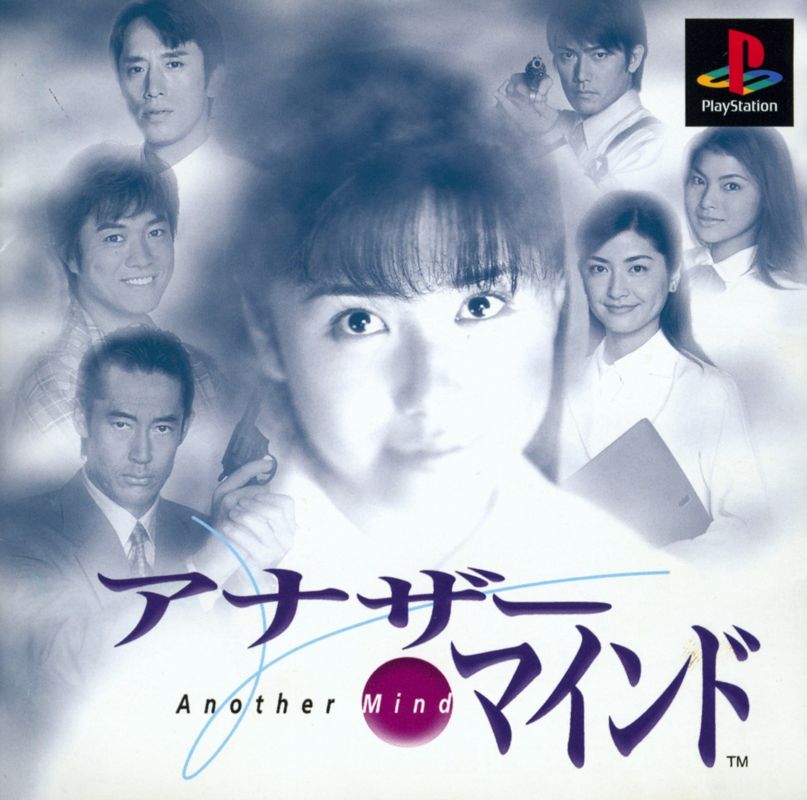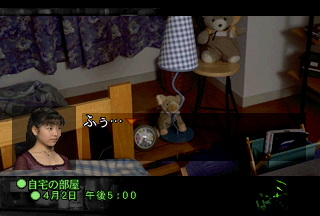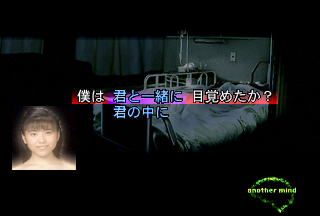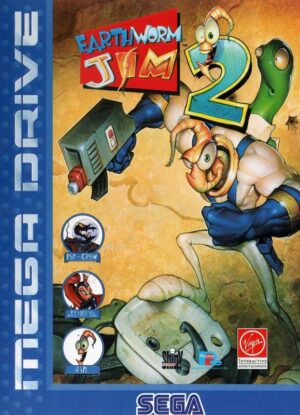Retro Replay Review
Gameplay
Another Mind delivers a unique blend of full-motion video (FMV) and interactive storytelling that sets it apart from conventional visual novels. Players step into the role of the mysterious “other mind” sharing Hitomi Hayama’s consciousness, making every decision a direct collaboration—or conflict—with her. Instead of selecting prewritten dialogue choices, you assemble words and sentences from a dynamic word bank, giving you unprecedented freedom to express tone, intent, and nuance.
(HEY YOU!! We hope you enjoy! We try not to run ads. So basically, this is a very expensive hobby running this site. Please consider joining us for updates, forums, and more. Network w/ us to make some cash or friends while retro gaming, and you can win some free retro games for posting. Okay, carry on 👍)
This assembly mechanic adds a layer of puzzle-solving to each interaction. Crafting the right phrase can calm Hitomi’s panic, coax her to reveal hidden memories, or push her toward decisive action. The challenge lies in interpreting her emotional state and selecting words that resonate. Early sessions may feel trial-and-error, but as you learn Hitomi’s personality, each successful dialogue becomes deeply rewarding.
Another Mind also uses branching paths to reflect the power struggle between you and Hitomi. Your influence can steer her toward recovery or deeper turmoil, and multiple endings encourage replayability. While some choices may lead to repetitive FMV sequences, the interplay of emotion and logic in the word-assembly system keeps engagement high throughout the roughly four- to six-hour playthrough.
For players who enjoy psychological drama and hands-on narrative control, the gameplay in Another Mind will feel fresh and compelling. However, those seeking fast-paced action or traditional RPG mechanics may find the slow, contemplative pacing less appealing. Ultimately, the heart of the experience lies in the delicate balance of coexisting minds and deciding who truly calls the shots.
Graphics
Another Mind embraces its FMV roots, featuring real actors and meticulously designed sets that bring Hitomi’s hospital room, family home, and dreamlike flashbacks to life. The camera work and lighting capture subtle facial expressions and body language, crucial for interpreting Hitomi’s state of mind. Close-ups emphasize her fear and confusion, making your in-game interventions feel urgent and personal.
While the video resolution may not match today’s high-definition standards, the intentional grain and lighting choices lend the experience a gritty, cinematic quality. Set dressing—from hospital monitors to faded family photos—adds authenticity to every scene. Costume and makeup teams excel at portraying the trauma aftermath, with bruises, blood spatters, and sterile medical attire reinforcing the game’s emotional weight.
Transition effects between FMV clips and interactive screens are smooth, avoiding jarring cuts that could break immersion. The user interface, with its word-selection grid, is clean and intuitive, though text size may strain those playing on smaller displays. Subtitles are well-synced and legible, catering to players who prefer to read dialogue or have hearing impairments.
Overall, Another Mind’s graphics strike a balance between theatrical realism and psychological atmosphere. While it may not boast the polygon counts of modern 3D engines, its commitment to practical visuals and tangible detail makes every scene feel lived-in—and every choice feel consequential.
Story
The narrative of Another Mind is both haunting and deeply human. Hitomi Hayama, a bright 16-year-old, awakens in a hospital bed after a devastating car crash, only to discover another consciousness residing in her head. As the player, you are that “other mind,” tethered to Hitomi’s psyche and bound by her memories, fears, and desires.
The story unfolds through a careful interplay of past and present. Flashbacks reveal Hitomi’s relationships with family and friends, the events leading up to the accident, and hidden traumas she’s buried. Your presence influences how— and if—she recalls these moments. Do you gently guide her toward healing memories, or do you probe the darkest corners of her mind for answers?
Every decision carries emotional weight. Confronting Hitomi with harsh truths risks fracturing her sanity, while overly protective choices may leave vital mysteries undiscovered. This duality creates a narrative tension that keeps you invested: you’re not just observing a story; you’re co-authoring it through dialogue and empathy.
Moreover, the branching endings underscore the game’s theme of coexistence. Whether Hitomi fully regains autonomy, remains trapped in internal conflict, or meets a tragic fate depends on the synergy between you two. The story encourages multiple playthroughs to explore every facet of this fragile mindscape.
Overall Experience
Another Mind stands out as an ambitious experiment in FMV-driven, choice-based storytelling. Its strength lies in the interactive word-assembly mechanic, which transforms dialogue into a hands-on puzzle and fosters genuine emotional engagement. Few games dare to place such responsibility in the player’s hands—and few succeed as well.
The emotional intensity can be overwhelming at times. Moments of despair, confusion, and fleeting hope hit hard, thanks to strong performances from the cast and evocative direction. If you’re drawn to character-driven drama and psychological exploration, this game will resonate long after the credits roll. Casual players, however, may find the slow pace and cerebral mechanics taxing.
Technical hiccups are rare but present: occasional video stutters, minor subtitle mismatches, and the learning curve of the word grid can interrupt immersion. Still, these issues are outweighed by the overall polish and narrative ambition. The branching paths and multiple endings offer substantial replay value, inviting players to experiment with different conversational styles and moral choices.
In summary, Another Mind delivers a gripping blend of drama and interactivity. It challenges you to navigate the delicate relationship between two consciousnesses and wrestle with the meaning of identity, guilt, and recovery. For those seeking a thoughtful, emotionally charged experience that defies genre conventions, this title is a must-explore journey into the uncharted territory of the human mind.
 Retro Replay Retro Replay gaming reviews, news, emulation, geek stuff and more!
Retro Replay Retro Replay gaming reviews, news, emulation, geek stuff and more!









Reviews
There are no reviews yet.